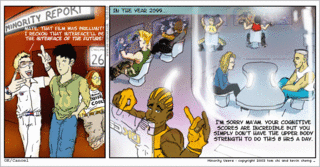Thursday, October 27, 2005
Gettin' ILL
I can empathize with Elevatedprimate. I've spent this month requesting books from every corner of Illinois.
Wednesday, October 19, 2005
Rate my network diagram .com

[From: Ratemynetworkdiagram.com]
Tuesday, October 18, 2005
Another critique of IT use as depicted in film...

[From: OK/Cancel]
There was also the climactic scene where, for some reason, a file had to be physically removed from one screen and walked over to another. Yeah right, all that futurism and still the climax relies on sneakerware.
Transparent Aluminium & Scotty @ 120 WPM
From : john helsabeck
Sent : Tuesday, October 18, 2005 4:04 PM
To : Shaun Slattery
Subject : Transparent Aluminium!?
Remember the part in that God-Awful Star Trek movie - the one where they go back in time to save the whales - where Scotty reveals the molecular make up of transparent aluminium in return for a small batch of the stuff because it is needed to construct a holding tank for a soon-to-be-saved whale?
At first, Scotty tried talking to the computer. "Computer? Hello, Computer?" Then, when someone pointed to the mouse, he picked it up and spoke into it, "Computer?" Finally, realizing that he was going to have to use a keyboard, he proceeds to FLY over the keyboard, typing and switching between windows at alarming speed, until he finally reveals a picture of a transparent aluminium molecule.
What's up with that? If dude has never had to type before because, in his time, you can just talk to computers, why the hell would he be proficient with QWERTY? And why the hell would he know any of the programs they use?
Mr. Nimoy, you disappointed me.
Oh yeah, about that transparent aluminium.... Apparently it is time to move it to the 'Science Fact' category:
http://www.af.mil/news/story.asp?id=123012131
Saturday, October 15, 2005
Friday, October 14, 2005
Interruption Science
Technology forces us to juggle competing demands on our attention over the course of our workdays. Alex Chadwick speaks with New York Times Magazine contributor Clive Thompson about "interruption science," the study of the effect of disruptions on job performance.The research isn't as productivity-driven as it sounds. In fact, much of it echoes Johnson-Eilola's Datacloud which I'm re-reading. For example...
No link yet for article they're talking about. [Update: Ah, here it is, via 43 Folders.]
Over-attributing Causality
 One danger in research is the desire to interpret all findings as meaningful. Here’s an interesting example from our campus bookstore…
One danger in research is the desire to interpret all findings as meaningful. Here’s an interesting example from our campus bookstore… A colleague of mine, knowing my interest in such things, notified me of a change in the size of our blue exam books, from 8 3/8 x 6 3/4, 12-page to 8 1/2 x 11, 24-page:
“How interesting,” I thought. I began to hypothesize: “I wonder if they had complaints about the old smaller books. I wondered if students filled more than one during exams and faculty ran into problems grading multi-book responses. Or perhaps more exams were requiring more writing. Wouldn’t that be something!” So I wrote to our bookstore manager to inquire about the reason for the change. The answer?
We ran out. We will replentish (sic) and have both sizes.
Ah, of course. How silly of me to forget Occam’s razor: The simplest answer is usually preferable.
Wednesday, October 12, 2005
Co-locating the Tools of Annotation
 "Post-it® Flag Highlighters and Pens" -- while innovative and perhaps useful, this company's product proliferation is getting as bad as Oreos'.
"Post-it® Flag Highlighters and Pens" -- while innovative and perhaps useful, this company's product proliferation is getting as bad as Oreos'.
New Hope for PowerPoint
...the point at which a new technology gives the broad public access to tools once considered the domain of a specific profession, resulting in an explosion of artifacts. Most of these artifacts will be badly produced, but a few will be genuine innovations, and the artifacts will eventually regain regularity as the public acquires a more discriminating eye (and templates).Are the bad artifacts the result of unskilled folks or bad technology? Probably both, but I think two recent changes to typical PowerPoint presentation styles are beginning to combat so-called Powerpointlessness -- the "Lessig Method" (from Presentation Zen) and the Kawasaki & Takahashi Methods (from Presentation Zen and 37 Signals).
These artistic flights from the typical PowerPoint fare work best for "sexy" high-profile presentations but may or may not be appropriate for the vast majority of situations that require presentations. For example, I wonder how it would impact a classroom -- more interesting, but less followable.
And while I'm banging on about reconceptualizations and critiques of PowerPoint, I might as well mention David Byrne's art (from Wired, Byrne's site, NPR, CNN, etc.) and the oldie-but-goody, Peter Norvig's Gettysburg Powerpoint Presentation.
[Update: Beyond Bullet Points, "a book on understanding PowerPoint presentations as stories" -- as posted on Datacloud]
But here's my all-time favorite use by Boston-based band Bishop Allen.




